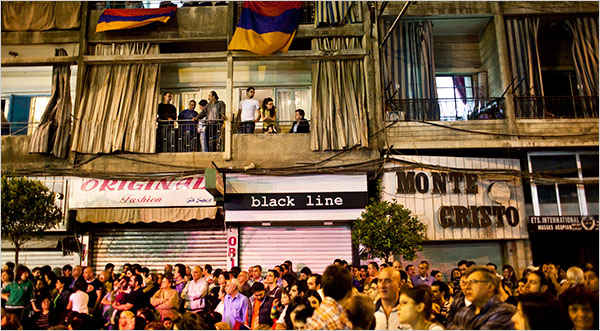|
|
By Ruzanna Stepanian
Russian President Dmitry Medvedev on Tuesday publicly offered to host the next meeting between his Armenian and Azerbaijani counterparts which international mediators hope will produce a breakthrough in their protracted efforts to resolve the Nagorno-Karabakh conflict.
“I hope that we are at an advanced stage,” Medvedev said during an official visit to Yerevan, commenting on the current state of the Karabakh peace process spearheaded by Russia, the United States and France.
“I hope that the three presidents will meet very soon to continue discussions on this theme,” he said. “I hope that the meeting will take place in Russia.”
The American, French and Russian co-chairs of the OSCE Minsk Group have been pressing the presidents of Armenia and Azerbaijan to meet in the coming weeks and iron out their remaining differences on a framework peace accord proposed by them last year. “Our understanding is that such meetings will take place shortly after the forthcoming [October 15] presidential elections in Azerbaijan,” Russian Foreign Minister Sergei Lavrov said earlier this month.
Speaking at a joint news conference with Medvedev after their talks, President Serzh Sarkisian reiterated that the proposed peace deal is on the whole acceptable to the Armenian side because it upholds the Karabakh Armenians’ right to self-determination. “The main thing is that we believe the conflict can be resolved by mutual compromise and by means of negotiations,” he said.
Medvedev said he and Sarkisian discussed the Karabakh conflict “in detail” but did not comment on chances of its near-term resolution, saying only that “both sides are ready to look for solutions.”
The two leaders also discussed the broader security situation in the region in the aftermath of Russia’s recent war in Georgia as well as Russian-Armenian economic relations. The latter issue was the main theme of a separate Medvedev-Sarkisian session that was attended by members of the Russian-Armenian inter-governmental commission on economic cooperation.
The commission met in Yerevan on Monday. Medvedev noted the fact that Russia remains Armenia’s number one trading partner.
According to Armenia’s National Statistical Service, the volume of Russian-Armenian trade rose by almost 20 percent year-on-year to $482.4 million in the first eight months of this year. The figure is equivalent to 14.65 percent of Armenia’s overall foreign trade turnover registered in this period.
“Our current economic relations are impressive but tend to lag behind our political relations,” Sarkisian said, calling for the launch “large-scale joint projects.” He said he and Medvedev discussed potential Russian involvement in two such projects: the planned construction of a new Armenian nuclear plant and an Armenia-Iran railway.
Medvedev said Moscow “will do everything to strengthen and develop our strategic partnership” with Armenia as he and Sarkisian inaugurated a square in central Yerevan named after Russia earlier in the day. “I am convinced that coordinated actions in the international arena is a serious factor of security and strengthening of our positions both in the Caucasus region and the world,” he said.
“Today this square is becoming yet another symbol of loyalty to the traditions of centuries-old brotherhood and spiritual kinship between our peoples,” Sarkisian said during the ceremony.




